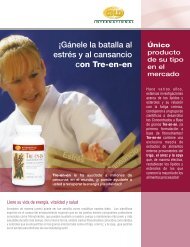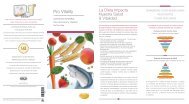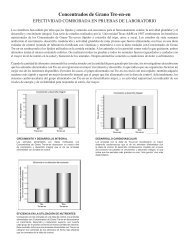Garlic Allium Complex
Garlic Allium Complex
Garlic Allium Complex
- No tags were found...
You also want an ePaper? Increase the reach of your titles
YUMPU automatically turns print PDFs into web optimized ePapers that Google loves.
GARLIC AND OTHER ALLIUM VEGETABLESHUNDREDS OF ACTIVE COMPOUNDSIN EACH BULBScientists have yet to credit a single compound asresponsible for the benefits of allium vegetables. <strong>Garlic</strong>, forinstance, contains more than 200 different compounds! Ofvitamins and minerals, garlic supplies high levels of phosphorus,potassium, sulfur, and zinc; moderate measures of seleniumand vitamins A and C; and lesser amounts of calcium,magnesium, sodium, iron, manganese, and B-vitamins.alliums also contain flavonoidsand other antioxidants,essential oils and fatty acids,amino acids, pectin,carbohydrates, and sulfurcompounds (notably allicin).Allicin reacts with oxygen toproduce more than 70 sulfurcompounds! “It is these materials that are believed to bemedicinal,” says David Roser, head of the <strong>Garlic</strong> ResearchBureau in Bury Saint Edmunds, England.COMPOUNDS DORMANT UNTIL BULB IS CUTOR CRUSHEDHave you ever wondered why an intact garlic clove or onionbulb is relatively odorless compared to the diced vegetable?The answer is in the chemistry!In garlic, unbroken cloves contain a stable, odorless chemicalcalled alliin, which has no known biological activity. Cuttingor crushing garlic, however, causes the release of an enzymecalled allinase, which quickly converts odorless alliin toallicin, the smelly sulfur compound that gives garlic itscharacteristic scent and taste.Allicin, although very unstable, accounts for:■ most of garlic’s antifungal and antibacterial activity■ most of its antiparasitic action in the intestinal tract■ some of its lipid-lowering and anticlotting effects in the blood■ some of its ability to help protect against cancer.Within hours, allicin is transformed into ajoene, a stablecompound with different biological activities than its parentcompound. Ajoene confers:■ most of garlic’s anticlotting activity (research shows ajoene isbetter than aspirin at preventing blood clots!)■ some of its ability to lower triglycerides in the blood■ some of its anticancer activity.HEALTH BENEFITS OF GARLIC AND OTHER ALLIUMSEvery morning, after we do our yoga, we each take a clove ofgarlic, chop it up and swallow it whole.— Sarah L. (age 104) and A. Elizabeth (age 102) Delany intheir book Having Our Say: The Delany Sisters’ First 100 YearsSince allium vegetables have been used throughout history asfolk remedies, they are a natural subject of investigation formodern researchers. In the past century, more than 1,300research articles have been written about garlic alone! Thisintense research effort has confirmed many health benefits ofallium vegetables, particularly with regard to heart disease, highblood pressure, gastro- intestinal cancer, and infectious diseases.Laboratory studies have identified key compounds in garlicand onions responsible for many of their benefits. In addition,population and clinical studies show that regular consumptionof allium vegetables is associated with:PROTECTION FROM INFECTIOUS DISEASE■ Inhibition of bacterial growth■ Inhibition of fungal growth and yeast overgrowth■ Inhibition of intestinal parasitesPROTECTION FROM CARDIOVASCULAR DISEASE■ Reduced levels of blood lipids (cholesterol andtriglycerides), which in turn lower the risk of stroke, heartattack, and other cardiovascular diseases.■ Inhibition of blood clotting (reduces platelet aggregation andhelps dissolve clots)■ Lowered blood pressure. (High blood pressure is a majorrisk factor for stroke.)PROTECTION FROM CANCER■ Decreased risk of cancer, especially gastrointestinal cancer,because they help:• detoxify carcinogens (cancer-causing substances)• inhibit the formation of carcinogenic nitrosamines• activate enzymes that detoxify carcinogens• inhibit binding of carcinogens to DNA• inhibit tumor formation, promotion, and growth• modulate the immune system• prevent cell damage caused by free radicalsTHE NOSE KNOWS THE POWER OF GARLICTo reap the benefits of allium vegetables, you have to eatthem consistently and in quantities that can cause painful orsocially undesirable consequences — bloating, flatulence,heartburn, belching, and bad breath. Allicin, the key to manyof garlic’s health benefits, is what makes garlic smell. Butsometimes it’s hard to take the good along with the bad. Casein point: Allicin is the subject of two U.S. patents held by itsdiscoverer, Chester Cavallito, but its clinical use as anantibacterial agent was abandoned after a brief trial because ofthe substance’s odor. Why did Mother Nature produce suchfoul-smelling chemicals? Since allicin is an antifungal agent, itprotects garlic bulbs from decay. And lacrimatory factor, thesubstance in cut onions that makes people cry, can irritate andrepel animals. Scientists believe that these compounds confer asurvival benefit to allium plants.IF YOU TURN UP YOUR NOSE AT ALLIUMS, YOUMAY BE TURNING YOUR BACK ON GOOD HEALTHThe health benefits of garlic and onions are well known. Yetmany people avoid alliums because they don’t like their tasteor smell, don’t want garlic or onion breath, or reject thesenatural health treasures for other reasons. But those who turnup their noses at garlic and onions may be turning their backson optimal health.Products – 4.06 P-101
















